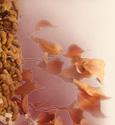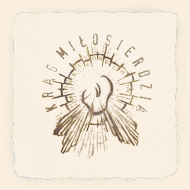 |
 |
 |
 |
 |
 |
 |
   .jpg) |
    |
 |
|
 |
 |
t. Faustyna describes in her Diary how the process of the dissemination of the Works of Mercy will take place, as it were in three intensities of hue [the English translation of the Diary refers to “three aspects”],
“but it all comes down to one”, that is “that souls separated from the world will burn as an offering before God’s throne and beg for mercy for the whole world… and by their entreaties they will obtain blessings for priests, and through their prayers prepare the world for the final coming of Jesus” (Diary, 1155). This aspect is fulfilled by the Congregation of the Servants of the Divine Mercy in Rybno. |
|
Another aspect of participation is “in prayer and deeds of mercy, without any obligation of taking vows. But by doing this, these persons will have a share in all the merits and privileges of the whole (congregation). Everyone in the world can belong to this group” (Diary, 1157).
The Circle of Mercy, instituted in April 2006, and which therefore fulfils this desire of St. Faustyna, is a form of spiritual participation in the charism of the Congregation of the Servants of the Divine Mercy in Rybno, for all those priests, monks and nuns belonging to other congregations or institutes of the consecrated life, as well as lay people, whom God calls to live this charism. It is not in opposition to the rule of any congregation, neither does it conflict with the lifestyle of diocesan priests or lay Catholics, but is a particular Divine gift for our time, linking in a wondrous form all the other gifts and charisms of the Church. Other conditions of joining this community, are: |
•
•
•
•
• |
daily recitation of the Chaplet to the Divine Mercy;
prayer for the Church and for priests (Diary, 1052);
a minimum of one good deed each day;
bearing witness to Jesus by their lives, in the place to which they have been called, faithfulness to their calling;
giving a priestly blessing given and extended to and encompassing the entire world (a condition for priests). |
The basis of this charism is acomplete trust in Jesus – entrusting (oneself) to the mercy of God, as well as an attitude of mercy, that is, being open to demonstrating and exemplifying in one’s own life the desires and efforts of Jesus to bring each human person to (spiritual) maturity and to eternal salvation. This occurs by means of a continual penetration into the mysteries of God, getting to know and recognise His great mercy and unfathomable goodness to His creatures, as well as bringing it closer to our neighbours. This is also shown by joining oneself to Jesus in love, entreating God’s mercy for oneself and others, awakening a trust in Divine Mercy, as well as by preparing the world in this way for the second coming of Christ into the world. As essential element of this charism is by undertaking one’s prayer, fasting, all one’s sacrifices and work, as well as the acceptance of sufferings and committing all one’s efforts, in (a spirit of) unity with Jesus, offering all these things, as Christ himself had said to St. Faustyna, for the whole world and particularly for the two precious pearls of His heart, that is, for the souls of priests and religious. Prayer, mortification, fasting or any kind of work or sacrifice, only attain value before God, when they are united with the prayer, fasting, mortification or work of Jesus himself. That is why each member of the Circle of Mercy, in the same way as the Sisters of the Congregation, allows him/herself to be led by the Holy Spirit, and attemps to model his/her life on that of Jesus from the manger to the Passion (Diary, 438).
Participation in the charism grants members of the Circle of Mercy the right to share in all the promises which Jesus gave, as noted in the Diary, to the Congregation, (sharing) in the spiritual goods of the Community, most importantly, to the particular protection of Jesus, similar to the protection granted to St. Faustyna, from the attacks of the evil one, but also encourages us to practice, similarly to the Sisters, but in a way suited to our state of life, the three evangelical virtues of poverty, chastity and obedience. For obvious reasons, for married lay persons this will entail spiritual warfare, in practising chastity and faithfulness in marriage, freedom from financial greed and the wise use of money for the good of one’s family, as well as obedience to the teachings of the Church. Therefore it is intended that the soul which becomes increasingly free from a variety of attachments, loving Jesus in an act of pure love, will, as it put it’s trust ever more strongly in God’s Divine Mercy, also intercede for, and obtain the same, for others.
St. Faustyna (Diary, 1158) encouraged each member of this third aspect (of the Work of Mercy), by which she meant the Circle of Mercy, to try to do at least one good deed each day. These works of mercy may be practiced in three ways: |
1.
2.
3. |
by our actions;
by our words, of forgiveness, or of encouragement or consolation;
by prayer, which is a means available to us, even when we are unable to undertake (practical) acts of mercy or to speak words of forgiveness or encouragement. |
St. Faustyna wants therefore to stress, that for “the many souls who are often worried because they do not have the material means with which to carry out an act of mercy”, that mercy of the heart , “which requires neither permissions nor storehouses, is much more meritorious, and is within the grasp of every soul” is available to everyone and has greater merit before God (Diary, 1317). It is impossible to dispel the impression that St. Faustyna is encouraging all of us, as members of the Circle of Mercy, to practice the corporal and spiritual works of mercy, which have long formed part of the Church’s teachings.
It is exceedingly important, that, both spiritual and corporal works of mercy, as well as other ascetic practices such as fasts, sacrifices, or other works done for the good of others, be undertaken for love of Jesus, and for the good, that is for the growth in the true humanity and salvation of our neighbours, as well as in unity with Jesus, with His actions and words of Mercy. We do this by a simple act of will and desire to undertake all this in union with Jesus, by an act of mercy similar to His, and for love of Him, with the intention of interceding for, and obtaining, mercy for the entire world, in particular for priests and religious. And so, for example, we unite our fasting with the fast of Jesus, our own sacrifices and corporal or spiritual acts of mercy with His sacrifices and actions, our work with the work which He did in Nazareth, our sufferings with His sufferings, as only then do they have value before God. We should avoid undertaking works of mercy, motivated by fear or by concern for the opinions of others (‘because it’s the right thing to do’, because we’re ‘worried what others might think’, or because ‘somebody might take offence’), or even for purely philanthropic reasons or even from a noble love for our neighbour. That is not enough. Only motivation ‘for the love of Christ’, that is, (out of concern for) thev(spiritual) development and salvation of a person so loved by Him, bestows the appropriate value upon works of mercy. As we can see, members of the Circle of Mercy must therefore constantly work at purifying the motives and intentions underlying their own actions as well as prayers to God to cleanse and purify their will and desires.
The third aspect of the practice of works of mercy to others, as given by St. Faustyna in her Diary, is to pray for them, and particularly for priests and religious. Obviously, this is also only of value, when it is constantly united in an act of will to the prayer of Jesus, as described in the Gospel. This prayer should be, firstly, the chaplet to the Divine Mercy, if possible, recited at 3 p.m. or at other times of the day. A specific prayer for daily recitation by members of the Circle of Mercy is dictated by St. Faustyna in the Diary
| |
P R A Y E R F O R T H E C H U R C H A N D F O R P R I E S T S : |
| 1052 |
O, my Jesus, I beg You on behalf of the whole Church: Grant it love and the light of Your Spirit, and give power to the words of priests so that hardened hearts might be brought to repentance and return to You, O Lord. Lord, give us holy priests, You, yourself maintain them in holiness. O, Divine and Great High Priest, may the power of Your Mercy accompany them everywhere and protect them from the devil’s traps and snares which are continually being set for the souls of priests. May the power of Your Mercy, o Lord, shatter and bring to naught all that might tarnish the sanctity of priests, for you can do all things. |
On the Feast of the Triumph of the Cross, September 14th 2007, the ceremony of the official dedication of the Community to Jesus, the King of Mercy, took place, including all it’s aspect’s and degrees of membership. From that time on, every person joining the Community, dedicates his/her life to Jesus, acknowledging Him as their sole Lord and King.
| |
A C T O F C O N S E C R A T I O N T O
J E S U S , K I N G O F M E R C Y : |

|
esus, King of Mercy, Our Lord, through the hands of Mary, the Mother of Mercy, we dedicate to You today and forever, all our communities, sisters and brothers, whom You deign to call to proclaiming the glory of Your Mercy and preparing the world for Your coming. We dedicate to you, all those who together with us worship Your Mercy in every time and place.
ware of our weakness, but trusting in Your never-ending Mercy, we entrust ourselves to Your Holy Will. You yourself sanctify us and make use of us as You will, in your work in the salvation of the world.
eign in our hearts and in our Community, may Your Holy Will be accomplished always and everywhere and in all, so that Your Kingdom may encompass all people for eternity. Amen. |
 |
 |
We also add a reminder of the corporal and spiritual works of mercy.
Corporal
works of
mercy: |
• to feed the hungry
• to give drink to the thirsty
• to clothe the naked
• to give shelter to travellers
• to console those in prison
• to visit the sick
• to bury the dead |
Spiritual
works of
mercy: |
• to admonish sinners
• to instruct the uninformed
• to counsel the doubtful
• to bear wrongs patiently
• to forgive wrongs willingly
• to comfort the afflicted
• to pray for the living,
the sick and the dead |
We would ask all those who wish to join the Circle of Mercy to contact us (by phone, letter,  e-mail or in person) in Rybno, giving: e-mail or in person) in Rybno, giving:
their first name and surname + their address + their diocese, religious congregation (for priests and religious) + contact details (phone number and e-mail address) + date of birth.
CONSIDERING THE PERSONAL DATA PROCESSING AND PROTECTION REQUIREMENTS, PLEASE TICK WHEN SUBMITTING YOUR DATA SHOULD YOU NOT WISH TO RECEIVE ANY CORRESPONDENCE.
|
|
| |
 |
|
|
 |
|







